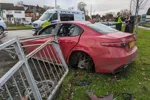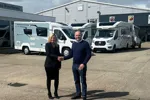Vehicle manufacturer approvals for paint maker products will become more important as they wrest control of the accident repair market away from insurers.
The End of Life directive, which becomes law next year, will force carmakers to assume responsibility for disposing of vehicles when they reach the end of their lives.
The legislation could act as a catalyst for revolutionising the motor industry, with some analysts predicting that personal leasing schemes could replace car ownership as the future method of mobility.
Jeremy Sharam, commercial manager, PPG AutoRefinish UK, believes this would give carmakers much greater control over the car, in terms of where it was serviced and repaired.
“If this vision is correct, the relationship would shift from insurance companies towards manufacturers,” he said. “The pace of change would vary, however. Some carmakers are looking at personal leasing now, others are not. Then there is the uncertainty over the future of Block Exemption.”
Every paint company has attempted to move closer in recent years to manufacturers by seeking approvals for their products. This would become more important should carmakers control the repair process – paint companies with an OE presence could stand to benefit most.
“At present, the manufacturer approval is a key to the door. It gives credibility but it is only one less obstacle to a sale, particularly as most are preferred partner schemes which include several paint brands,” said Mr Sharam.
“But having an OE paint presence could become critical if the manufacturers' influence over the repair process increases. They will want paint partners that have OE business so they can use one supplier for a cradle to grave service.”
The repair industry, struggling to make sufficient money due to low labour rates and high costs, faces additional pressure from falling accident rates.
“The car parc is still increasing, but there are other drivers like the rising proportion of write-offs, which are reducing work volumes. Write-offs also clog up the bodyshop car park,” said Mr Sharam.
“Repairers were booking weeks ahead, but many are now booking just a day or two in advance.”
Insurers and carmakers need to discuss ways of making cars more economical to repair rather than writing them off. This would improve customer satisfaction, reduce scrap waste and boost repair volumes.
Mr Sharam added: “Speed calming has also reduced the rate of accidents, but here there is an upside. Lower speed impacts mean fewer write-offs, giving the bodyshop some work.”
PPG is working with its bodyshops and distributors to help them improve efficiency. Its MVP programme, recently upgraded to include a Paint Shop Performance initiative, consists of a number of modules that measure, monitor and manage bodyshop performance to raise efficiency and improve profitability.
Paint companies, operating in a highly competitive marketplace, have put themselves under greater pressure after developing EPA compliant paints.
These new systems use less paint per job, while any wastage is minimised by smart scales which measure the exact volumes required.
Mr Sharam acknowledged that too many paint companies were competing for a share of a shrinking market in the UK, but said it was hard to predict which brands could close.> “If the market continues to shrink – and it could fall by another 20-25% over the next few years – market share will become vital,” he said. “The paint companies that lose market share may cut their cloth and get out of the UK.”
The industry, though, is now operating on a pan-European level. Paint companies that want European-wide approval by insurers and carmakers must, therefore, have a presence in every country.
“It's a tough call for companies to pull out premium brands unless they are willing to close them. Brands are strong in different countries – this isn't just a UK issue,” said Mr Sharam.













Login to comment
Comments
No comments have been made yet.